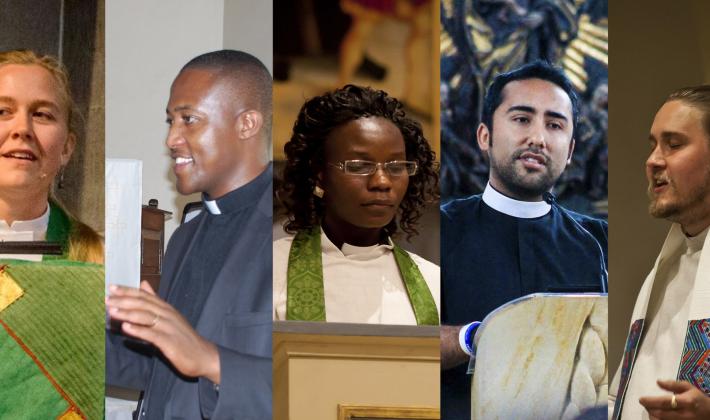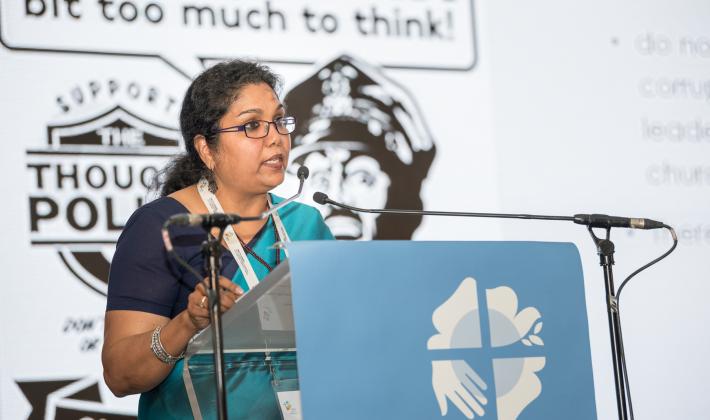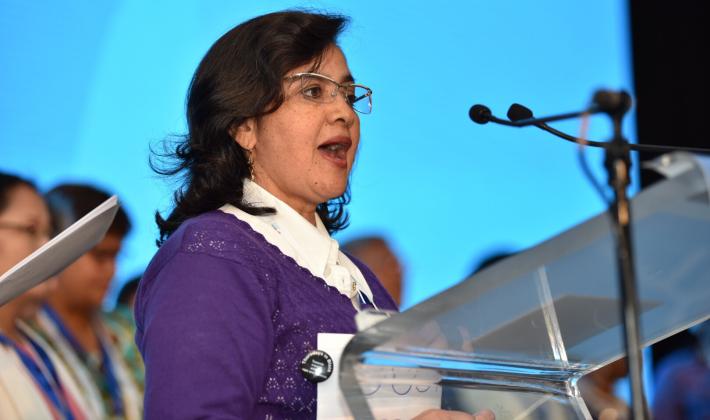South Sudanese refugees live in the same communities with their hosts in Northern Uganda. They share schools, roads, hospitals and water points. Unlike in most countries where they are denied refuge or fenced in camps, in Uganda they move freely, work for a living and are also given land from the government and nationals where they can construct permanent shelters. This is made possible by the existence of an open, unique and friendly refugee policy in Uganda.
Since “Human beings are not for sale”, humanitarian organizations like The Lutheran World Federation (LWF) and UNHCR, among others, provide support to over 1.2 million refugees in terms of basic needs like food, water, education, shelter in Uganda. “Host community residents offer their land for refugee settlement, and they don’t consider them refugees but brothers in need,” said Jesse Kamstra, LWF Country Representative in Uganda and Burundi.
Many countries in Africa continue to welcome refugees, even countries in conflict like South Sudan. “Insecurity and famine has not stopped South Sudan from welcoming people in need of a home. South Sudan has offered asylum to over 500,000 refugees from ten countries around the world including Egypt, Syria, Eritrea, Somalia among others,” Girma Benti Gudina, LWF South Sudan Country Representative told the LWF Assembly participants in a meeting on the refugee crisis in East Africa.
Gudina continued to say that South Sudan’s doors are still open for more refugees despite the existence of 1.7 million South Sudanese refugees, inadequate resources for the overwhelming number of people in need like the three million internally displaced (IDP) and approximate five million at the brink of the worst famine and suffering.
Humanitarian support to refugees
To improve refugees’ and IDPs’ welfare in South Sudan’s camps, LWF provides them education and child protection in Gendrassa, Kaya and Yusuf Batil refugee camps in the Upper Nile state and in Ajoung Thok refugee camp in Unity State, two of the most contested regions in the current civil war.
“LWF ensures that refugees receive education, even secondary school in most of its country programs. We are educating and preparing refugees to develop and manage their countries when they eventually return back to peaceful homes,” said Jesse Kamstra, LWF Uganda.
With the education, training and skills acquired, refugees are offered skills and job opportunities through livelihood projects in LWF’s country programs in Africa. Speaking on behalf of the LWF-Kenya Country representative, Anne Wangari Ndirangu, team leader of the LWF emergency hub in Nairobi, said that refugees get start-up kits for businesses like crafts making and thereafter are linked to markets. “Refugees craft bags, souvenirs and more products, which are sold in both their communities and internationally online,” she added. Ndirangu continued to say that this is done to provide them a source of income to supplement the aid they get.
Challenges in settling refugees
It is absurd that some countries close their doors to refugees, Kamstra said. In his opinion, refugees should be welcomed and treated with kindness and respect because they do not flee out of choice but to look elsewhere for peace and hope.
In countries where refugees are received, humanitarian organizations that aim at supporting and providing a better welfare to them encounter various social, protection and financial challenges.
Sophie Gebreyes, LWF-Ethiopia Country Representative, said that stringent refugee policies that deny refugees some of their rights remain a key problem in most of the refugee welcoming countries. “Ethiopia has an open door policy to refugees; however, they are not allowed to work or even move out of the camps. This is limiting their potential and creativity. Refugees should not just be welcomed but be granted the freedom of movement and right to work for a living so that they live as normally as they did in their countries of origin,” added Gebreyes. She however added that Ethiopia is in the process of revising the refugee proclamation, which might offer better conditions for refugees in the future.
Stretched resources compared to the growing overwhelming numbers remain another major challenge in the humanitarian world as Kamstra said that limited funding also limits and delays response and aid to refugees during times when they need it most.
Giving back to host communities
Humanitarian organizations return the host community’s generosity by ensuring that their (host communities) needs are considered. Kamstra explains that thirty percent of the aid extended to communities with refugees in Uganda is focused on developing the host community infrastructure. “Through an integrated approach focused on supporting both refugees and hosts, we extend clean water and education resources to the nationals in the communities where refugees are hosted,” he added. Gebreyes says that developing and providing incentives to refugee host communities is a priority to prevent a development gap between the two groups. “It also prevents tensions between refugees and the host community residents,” she adds.
LWF/Shamim Nalubega



